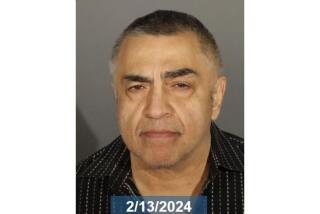‘Mastermind’ of Shooting Named
IRVINE — In court documents released Wednesday, investigators for the first time alleged that the co-founder of Biofem Inc., Larry C. Ford, was the mastermind behind the attempted slaying of his partner.
Until now, authorities have said little about any role Ford, 49, might have played in the shooting of Biofem CEO James Patrick Riley, calling him only a “possible suspect.” Ford committed suicide in March, a day after police searched his Irvine home in connection with the attack.
But more than 170 pages of search warrants unsealed by a judge indicate that detectives quickly concluded that Ford “masterminded the assassination of the victim for financial gains related to the business activities of Biofem.”
The search warrants provide no further details about a possible motive, nor do they outline a conspiracy against Riley, 58. But in an interview with police, Riley said the company had achieved a major research breakthrough shortly before the shooting and that, using the data, he and Ford planned to create a new company that would be worth far more than Biofem.
Prosecutors contend that at least three people were involved in plan to kill Riley as he arrived for work on Feb. 28: a gunman, a getaway driver and the mastermind. Officials have left open the possibility that others played a role.
They charged that Los Angeles businessman Dino D’Saachs, 56, drove the gunman to and from the scene. D’Saachs, a close friend of Ford for 20 years, has pleaded not guilty.
Detectives searching D’Saachs’ home found an instructional manual on executing a successful killing, along with photographs of Riley, his home and his business.
According to the search warrants, D’Saachs told detectives soon after his arrest that he had been parked at the Irvine Spectrum that morning, but insisted he was there only to protect Ford.
D’Saachs said Ford had expressed concern for his safety after taking out a $5 million insurance policy on himself for his business, according to the warrant. Such “key man” policies are common to protect businesses against the loss of a vital employee.
D’Saachs told investigators that as he drove from the parking lot near Biofem’s office, a man dressed in black and carrying a small black bag stopped him to talk, the warrant said. D’Saachs said he stopped his vehicle, allowed the man in and then gave him a ride to a business about two blocks away, according to documents.
But the suspect’s statement conflicts with accounts of witnesses and Biofem employees. They told detectives they saw a man in black carrying a pistol run to the parking lot and dive into a vehicle matching the description of D’Saachs’ van.
Moreover, Biofem’s attorney has insisted that neither the company nor anybody else had an insurance policy on Riley or Ford.
The unidentified gunman fired a pistol from close range at Riley as the executive left his car. The bullet ricocheted off Riley’s cheekbone and smashed through a nearby office window.
Ford committed suicide later that week. Then, authorities evacuated more than 200 of his neighbors as police dug up a cache of illegal weapons and explosives from Ford’s home.
Detectives also found suspicious substances in jars in Ford’s refrigerator. Tests revealed that some of the samples included germs that cause typhoid and cholera. Sources have told The Times that FBI agents are trying to determine whether Ford was using the bacteria for research on biological weapons or for work related to Biofem.
According to the search warrants, detectives began widening their probe beyond Ford and D’Saachs within weeks of the shooting. One figure who featured prominently was Ford’s longtime colleague, Dr. Jerry Nilsson.
The Anaheim surgeon told investigators he was working with Ford on a “great humanitarian effort” related to the introduction of a female contraceptive device in South Africa. Several people close to Ford told detectives that Nilsson had made an offer to buy Biofem, according to the search warrants.
Eventually, police obtained a search warrant for Nilsson’s home and searched it with SWAT officers and a hazardous materials team. Nothing hazardous was found.
In their search warrant, detectives called Nilsson a “primary suspect.” But police have not arrested him and said that Nilsson was fully cooperative during a second interview with detectives.
Search warrants show that police also heard from women who complained of problems ranging from cancer to abdominal infections after treatment by Ford. State and county health officials investigated a handful of the cases and concluded that there was nothing to suggest that Ford experimented on patients.







